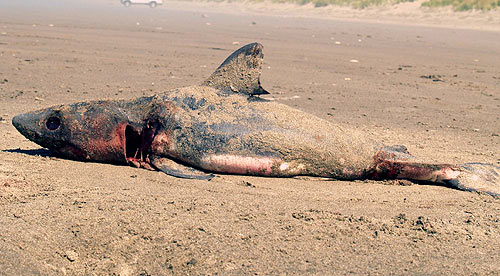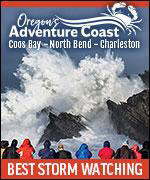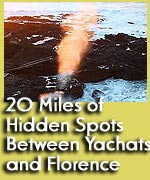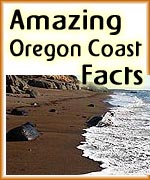 |
Predators of Oregon Coast and Forests May Have Something In Common
Published 12/03/2010

(Corvallis, Oregon) – Those monsters of the deep off the Oregon coast, and the furry and ferocious creatures of the forest may have something quite interesting in common (above: a shark washes up on the north Oregon coast - photo Seaside Aquarium).
Of course, this is not limited to Oregon - it just took some Oregonians to help figure it out.
A study done in partnership between Oregon State University and the University of Washington indicates that large predators in marine environments and on land may have some striking similarities in how they affect their environment, especially wolves and sharks.
Researchers studied interaction between wolves and elk in the United States, as well as sharks and dugongs in Australia, concluding the importance and the roles of sharks and wolves in their environments could be very similar.
In both areas, major predators help to control the populations of their prey. But there's also something called the “ecology of fear,” where these creatures also affect the behavior of the prey, with ripple impacts on other aspects of the ecosystem and an ecological significance that goes far beyond these species.
The study was recently published in Frontiers in Ecology and the Environment, a professional journal.
“For too long we’ve looked at ecosystem functions on land and in the oceans as if they were completely separate,” said William Ripple, a professor in the Department of Forest Ecosystems at Society at OSU, and an international expert in the study of large predators such as wolves and cougars. “We’re now finding that there are many more similarities between marine and terrestrial ecosystems than we’ve realized. We need to better understand these commonalities, and from them learn how interactions on land may be a predictor of what we will see in the oceans, and vice versa.”
In this study, Ripple and collaborator Aaron Wirsing, a researcher with the School of Forest Resources at the University of Washington, compared what has been learned about wolf and elk interaction in Yellowstone National Park in the U.S. to the interplay of tiger sharks and dugongs in Shark Bay, Australia. Dugongs are large marine mammals, similar to manatees, that feed primarily on seagrasses and are a common prey of sharks.
In studying elk, scientists found that the presence of wolves changes their behavior essentially all the time, causing them to move around their area in such a way as to avoid encounters, leave room for escape and keeping them in a heightened state of vigilance. The elk graze less in sensitive habitats, which in Yellowstone is helping streamside shrubs and aspen trees to recover, along with other positive impacts on beaver dams and wildlife.
Conceptually similar activities are taking place between sharks and dugongs, the researchers found. When sharks are around in great numbers, dugongs graze less in shallow waters – where they are more open to being attacked. They wind up sacrificing food they would normally consume. This, in turn, lets seagrass meadows thrive as they get depleted less by the creatures. Other plants eaten by the dugongs also fare better, as thus other marine animals that depend on these plants.
Related marine interactions have been observed in the North Atlantic Ocean, Ripple said. As shark populations were diminished by overfishing, the number of rays increased, which in turn reduced the level of sea scallops, an important fishery.
The marine/terrestrial similarities are also reflected in the body condition and health of species, the researchers noted. In Shark Bay, green sea turtles are more willing to face risks from sharks and seek the best grazing areas when their body condition is strong. In like fashion, the common wildebeest on the African Serengeti are less vulnerable to attack by lions or hyenas when their physical condition is good.
A more frequent information exchange between terrestrial and marine ecologists could provide additional insights into ecosystem function, the researchers said in their report.
More About Oregon Coast hotels, lodging.....
 |
 |
 |
 |
LATEST OREGON COAST NEWS STORIES
Yachats' Little Log Church the Center of Renewal Ceremonies on Oregon Coast |
Back to Oregon Coast
Contact Advertise on BeachConnection.net
Secrets of the Season |
Unusual Travel Articles TravelParanormal.com allows you to submit your own creepy tale or debunk one - or see up-to-the-minute news headlines about travel and the paranormal. News Headlines from All Over Oregon Need to scan Oregon headlines? Constantly updated news from all over Oregon: a comprehensive, up-to-the-minute display of news headlines from a variety of media |




































